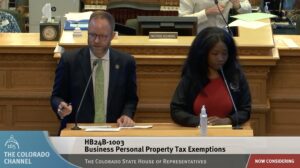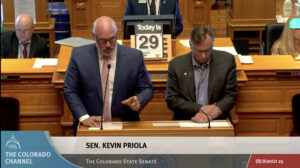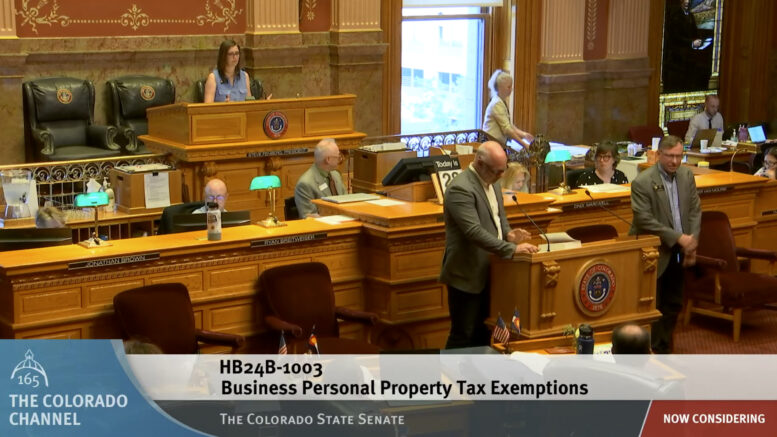Colorado legislators who focused heavily on cutting property taxes for homeowners during this week’s special session also approved one other tax break — one specifically focused on an emerging technology in the agricultural sector.
House Bill 1003, which passed both chambers by wide margins, expands and extends a 2022 law that defined produce-focused greenhouses and the equipment therein as agricultural equipment and thus exempted them from the business personal property tax. While such a focus for a bill may seem to have been far afield from the main concerns of the four-day session — and was a major reason some legislators opposed it — sponsors argued it fit under Gov. Jared Polis’ call to pass bills lowering property tax for 2025.
The primary need to address the issue now was because the two-year-old law creating the exemption was unconstitutional in two ways, argued Republican Rep. Matt Soper of Delta, who sponsored HB 1003 with Democratic Rep. Junie Joseph of Boulder.
Problems with a previous law
First, senators that year added a sunset clause that allowed the exemption to expire after 2027. However, because state law exempts agricultural equipment from paying business personal property tax, it goes against those laws to require anything defined as agricultural equipment to have to pay tax at any time, Soper noted.
Second, HB 22-1301, which defined “controlled environment agriculture facilities” as agricultural property that is exempt from the business personal property tax, did it too narrowly and classified some equipment in the facilities under that heading but not others. And that violates the uniformity clause of the state constitution, which requires state officials to treat all equipment in the certain class the same way for tax purposes, Soper explained during House debate on Tuesday.

Colorado state Reps. Matt Soper and Junie Joseph explain their business personal property tax bill to the House on Tuesday.
That original bill took care to define CEA facilities as nonresidential structures and related equipment that combines engineering and horticultural science to grow crops to obtain a monetary profit from the sale of plant-based food for human or livestock consumption. Through that, the law was able to say pointedly that greenhouses growing crops were eligible for the exemption, but not those growing marijuana or ornamental flowers — or even those that combined crops and ornamental flowers.
“That greenhouse that grows flowers, and that greenhouse that grows maybe sunflowers and some tomatoes or herbs … they are not going to get this exemption,” explained Colorado Property Tax Administrator JoAnn Groff to the Senate Finance Committee.
Tax break would now incorporate more equipment
But the bill got very specific in defining the equipment as that which optimizes hydroponics, plant quality and food-production efficiency from the land’s water for human or livestock consumption. Thus, by calling out hydroponic equipment specifically, the bill excluded equipment that grows crops in soil in a greenhouse, cutting out farmers using this technique, said cosponsoring Sen. Kevin Priola, a Henderson Democrat whose family once owned a greenhouse business.
HB 1003 includes as eligible for the tax exemption all personal property within a greenhouse used on a farm or ranch or in a CEA facility that’s used solely for planting or growing crops in the greenhouse in a raw or unprocessed state for eventual sale. This gives more direction to assessors that soil-based equipment is eligible for the tax break and that they should not classify the greenhouse and its equipment as manufacturing equipment, which too many still do, Priola said.
And, he and cosponsoring Sen. Mark Baisley of Woodland Park added, it lets farmers know that they’ll be able to get the same tax break on equipment that is used in a greenhouse as they do on similar equipment that may be used in a field.

Colorado state Sens. Kevin Priola and Mark Baisley explain their business personal property tax bill to the Senate on Thursday.
“This is to ensure that all equipment used to plant, grow and harvest crops, regardless of whether the crops are grown outside or under a roof, are treated the same for business personal property tax purposes,” Priola told the Senate Finance Committee on Wednesday.
More farmers using equipment in question
The expansion of the tax could become a lifeline to agricultural businesses as more use greenhouses to grow crops in small, temperature-controlled spaces. Garin Vorthmann, speaking for the Colorado Farm Bureau and the Rocky Mountain Farmers Union, noted that such facilities are increasingly used to grow lettuce, alfalfa, mushrooms and other products and should be treated as exempt agricultural equipment.
Chip Wernig, managing partner of Orchard Mesa Greenhouse in Palisade, said that CEA facilities such as those his business operates are spreading both regionally and nationally. Clarifying their tax status will be a boon for a sector of the economy where every dollar counts, he told the Senate Finance Committee.
“We are facing all the same risk factors growing tomatoes, strawberries and cucumbers indoors as we do on our outdoor crops,” Wernig said. “Every bit helps on the ag side of it.”
Wider changes coming to business personal property tax break?
The House passed HB 1003 by a 47-16 vote, with all the opposition coming from Democrats. Rep. Emily Sirota, D-Denver, said she felt that the bill could be taken up later and that its fiscal note, which explained that the state didn’t have enough information on CEA facilities to predict how much the tax exemption will lower local-government revenues, was lacking.
Meanwhile, the bill passed the Senate by a 26-8 vote, but six of the “no” tallies came from Republicans, many of whom represented rural areas of the state. Sen. Cleave Simpson, an Alamosa Republican who sponsored the 2022 law, questioned whether the special session was the appropriate time for the change and added that he hasn’t seen official legal opinions that the two disputed clauses in that bill were unconstitutional.
While HB 1003 altered what is just a small portion of the state’s business personal property tax statutes, legislators in 2025 could consider wider changes to the law that affect a broader swath of companies. And that likely would be appealing to business leaders, who consider the levy on equipment and office furnishings to be an excessive burden because it continues to demand payment on depreciating assets long after they’ve been purchased.
A report from the Colorado Office of the State Auditor found that just 425 taxpayers took advantage of a tax credit offered on the first $18,00 worth of equipment, leading an interim committee to consider whether to make the credit more accessible or just scrap it. Rep. Lisa Frizell, R-Castle Rock, said she’d like to raise the business personal property tax exemption — the maximum amount of equipment a company can own without having to pay tax on it — from the current level of $52,000 to between $75,000 and $100,000.
